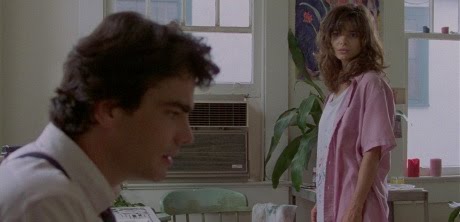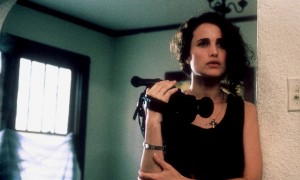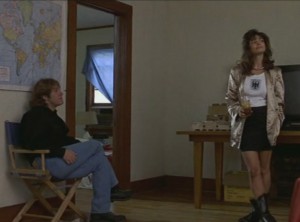From the Chicago Reader (August 24, 1989). — J.R.
SEX, LIES, AND VIDEOTAPE
*** (A must-see)
Directed and written by Steven Soderbergh
With Andie MacDowell, James Spader, Laura San Giacomo, and Peter Gallagher.

As its lowercase title suggests, sex, lies, and videotape is an example of lowercase filmmaking: lean, economical, relatively unpretentious (or at least pretentiously unpretentious), and purposefully small-scale. Its having walked off with the Cannes film festival’s Palme d’Or — making first-time writer-director Steven Soderbergh at 26 the youngest filmmaker ever to win that prize — saddles it with more of a reputation than it can comfortably live up to. In a time of relative drought, it’s certainly a small oasis, but the attention it’s been getting befits something closer to a breakthrough geyser.
All the fuss may be a sign of panic over more than just movies. Sexual repression is reflected in various ways in current pictures, but this is the only one that deals with it forthrightly as its central subject — specifically, as the main preoccupation of its two leading characters — and broaches sexual problems such as impotence and frigidity in the bargain. I haven’t heard such giddy, unnatural-sounding laughter in a movie theater since The Decline of the American Empire hit the art-house circuit a few years ago — the same sort of forced, hyped-up hilarity at the mere mention of words like “fucking” and “penis” and “getting off.” This makes it only that much harder to discuss a movie like Soderbergh’s, which tries to be level-headed and truthful about such matters.
It seems more a matter of chance than design, but sex, lies, and videotape makes its appearance when the national climate is shot through with maniacal puritanism. (This climate is beautifully parodied by Philip Roth’s impersonation of George Bush in the August 12 issue of the New York Review of Books. Roth’s Bush submits a constitutional amendment to Congress reading, “Neither menstruation nor masturbation shall exist within the United States or any place subject to their jurisdiction,” because “Menstruation is murder and masturbation, of course, is worse.”) Soderbergh, however, is not trying to comment on such a climate. Although he is concerned with therapy and healing, the movie itself is far too involved in the localized causes and effects of repression to have anything to say about it other than how it impinges on the lives of his four characters. This is plenty for any small-scale movie to tackle, and I don’t fault the film for shirking the subject’s wider and more social implications. But I am suggesting that the social climate the film doesn’t deal with is having an effect on how it’s being received, by audiences as well as critics.
The film focuses virtually all of its attention on four characters living in Baton Rouge, and although religion per se plays no discernible role in the plot, I don’t think it’s stretching things to say that two of these characters are treated by the movie as sanctified, while the other two are profane. The two sanctified characters, Graham (James Spader) and Ann (Andie MacDowell), are shown together at both the beginning and end of the film. At the beginning, they still haven’t met, but the film contrives to link their destinies: shots of Graham driving to Baton Rouge (returning, as we shortly discover, after a nine-year absence) are accompanied by the off-screen voice of Ann speaking to her therapist, and then scenes of these two supposedly separate characters and story lines are intercut.
Graham’s former roommate and frat brother is Ann’s husband, John (Peter Gallagher), a junior partner in a law firm whom we meet shortly afterward. Before long, we see him sneak out to see the other profane character, Ann’s sister, Cynthia (Laura San Giacomo), with whom he’s having a torrid clandestine affair.
Not long after John arrives at Cynthia’s house, Graham arrives at John and Ann’s house and meets Ann for the first time. The two profane characters and the two sanctified characters have now been paired off, and thanks to the economy of Soderbergh’s script, by the time we’ve arrived at this juncture we already know something about all four characters.
Around the same time that John is greeting Cynthia, for instance (with a potted plant he has brought from his office as a gift), Ann is telling her therapist that she doesn’t like sex much, and that lately she hasn’t wanted her husband to touch her. (Earlier, around the same time we see Graham stop at a filling station to shave and change his clothes in the men’s room, her therapist — who has a flat, nasal voice exactly like Johnny Carson’s — has pointed out that she tends to “obsess” on things that she can do nothing about.) When the therapist asks Ann if she masturbates, we see a close-up of her laughing and blushing, finally admitting that she tried it once but “it just seems so stupid”; she started wondering whether her dead grandfather was watching her. We also learn that Graham is coming to stay with her and John while he finds a place to live, and she’s not thrilled about having a guest. As for John and Cynthia, it’s established at the outset that he’s a self-contented yuppie (his tie and suspenders give him away at once) and that she despises Ann, taking pleasure in the fact that her sister is “a lousy lay.”
A bit further on, we discover that Graham is impotent and that he has a collection of videotapes of interviews with women about their sexual experiences, and that he “gets off” on watching these tapes. Between all four characters, an intricate series of rhyming traits is established, and much of the pleasure in Soderbergh’s script comes from the various ways these rhymes lock into place: Ann’s frigidity and Graham’s impotence; Ann and Cynthia’s mutual enmity (particularly regarding Ann’s prudishness and Cynthia’s brazen sexuality); John and Ann’s upper-crust life and material concerns; Cynthia and Graham’s relative downscale life-styles and attitudes (she works as a bartender and paints on the side; he has a minimum of possessions, and lives simply off his savings; both qualify as independent spirits); John and Cynthia’s mutual enjoyment of sex and mutual deception of Ann; Graham and Ann’s mutual hatred for liars.
As for the sanctity of Ann and Graham, a few more details are worth noting. Both characters have milk-white complexions (in contrast to John and Cynthia, who are relatively swarthy). Ann wears a crucifix on a necklace, which remains prominent throughout much of the film, and during dinner on the night of Graham’s arrival, John remarks to Ann — as an indication of his former friend’s weirdness — that “he used to direct his own chapel services.” It’s also significant that, before he finds an apartment, Graham explains that he likes having only one key (to his car) because “It’s clean,” and that the relative spareness of his apartment after he moves in suggests a certain monastic existence. Ann, on the other hand, as a compulsive housekeeper, is shown to have a fetish for cleanliness, which eventually leads to her discovery of John and Cynthia’s affair.
Ann and Graham’s hatred of liars and their sexual inhibitions are shown to be intimately interconnected; their eventual working out (or working through) of their sexual problems, which is implied without being shown, is predicated on their discovery of the truths about their own lives. The medium for this discovery proves to be interviews on video, which bring about revelations for all four of the characters (it would be difficult to say any more without giving away the plot), and the film positions these interviews in such a way that they explicitly rhyme with Ann’s sessions with her therapist. (Both interview forms are explicitly confessional, which suggests still another religious undertone to the plot and characters.)
There’s no doubt that the film shows a lot of promise. The dialogue is sharp and functional, the lead actors are all good, and the direction is unusually astute about concentrating our attention on the actors and what they say and not distracting us.
But in spite of these virtues, and a gift for story telling that utilizes some effective sound and image overlaps (which are especially prominent in the beginning of the film), Soderbergh’s mise en scene is not especially new or inventive. Apart from a vertically tilted shot of John and Cynthia resting in bed after an (unseen) heavy-duty bout of lovemaking, his use of framing is strictly conventional, while his reliance on close-ups, which makes perfect sense for the story he is telling, isn’t really orchestrated with the sense of dynamics that one would find in the work of a more mature director. Similarly, his camera movements are nicely plotted in relation to the dialogue and action without being stylistically distinctive. In short, Soderbergh’s directorial strengths and predilections are basically those of a good TV director — which is certainly nothing to sneeze at, but not the sort of equipment that is likely to change the face of cinema, at least at this stage of the game.
What’s most refreshing about sex, lies, and videotape in relation to other recent commercial movies is the obvious urgency of its theme for its writer-director, and his seriousness about pursuing it. Soderbergh has already suggested in interviews certain personal (if not directly autobiographical) links with his material, and it’s admirable that he has approached this material on his own terms rather than following the now-standard practice of fledgling directors of modeling their major concepts on those of well-known pictures.
In point of fact, the story that Soderbergh has to tell isn’t as new as he probably thinks it is; the use of video as a framing and distancing device is a veritable standby of self-reflexive cinema, particularly in relation to sex, and has been since the 60s (although film-within-film has often been used instead of video to serve an identical function). The same could be said of the film’s contrast between talking about sex and sex itself — a vein that has already been mined pretty thoroughly by Jean-Luc Godard, among many others. The point is that Soderbergh has rediscovered these devices for his own purposes rather than used them to indicate what other movies he’s seen. (Judging again from the interviews he’s given, his own cinematic touchstones — Carnal Knowledge, The Last Picture Show, and Five Easy Pieces — seem to have more to do with his age than with his aesthetics. And it appears that the superficial resemblance of his style to Eric Rohmer’s is purely coincidental.)
The personal side of his film also leads to certain limitations — such as the undigested marginalia that clutter the edges of certain scenes (the books in Graham’s apartment, the photos on his and Cynthia’s walls, Cynthia’s paintings, the gifts of various plants), rattling around loosely like random objects rather than adhering meaningfully to the characters’ identities or concerns, at least as the movie otherwise defines them. Another problem is the lack of sympathy for (which amounts to a lack of curiosity about) John, who is conceived throughout as a movie stereotype — the Gig Young part in a Hollywood comedy of the 50s or 60s, even down to his eventual professional comeuppance. Cynthia is accorded a bit more depth and flexibility, and maybe this is part of Soderbergh’s point: the sex that she and John enjoy is partly motivated by their mutual hatred of Ann, but only Cynthia seems to be aware of this fact.
Stepping outside the film’s framework for a moment, one might also question whether the film’s implicit puritanism — which has so much to do with the narrative tension and eventual moral reckonings, not to mention the film’s overall and widespread appeal — doesn’t finally represent a separate limitation of its own. A morality play about sexual haves and have-nots, it offers a lot of satisfaction to everyone who feels sexually deprived and/or maladjusted, which in this day and age undoubtedly includes most of the audience. But the movie’s reticence about the ultimate sexual and therapeutic victory of the have-nots — a graceful and tactful ellipsis that makes it all seem pretty transcendental and theoretical rather than material or sensual — leaves me wanting something more.




